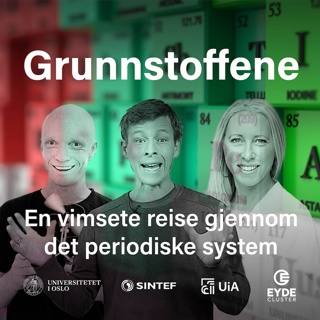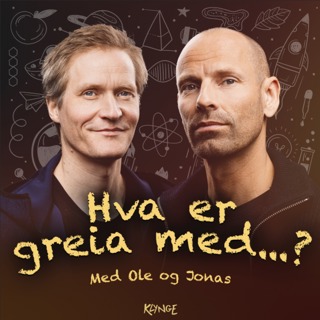
S2:E31 (5-Minute Summary) BIODIVERSITY, CLIMATE & AN ANTHROPOLOGIST WALK INTO A BAR...
This is the 5-minute(ish) summary version of our episode about the biodiversity crisis and it's links to climate justice with anthropologist Eduardo Brondizio. Eduardo is a professor at Indiana University. He's also Co-Chair of the IPBES Global Assessment on Biodiversity and Ecosystem Services. An organization dedicated to the furthering of conservation and sustainable use of biodiversity for long term human well being and ecosystem health. If you are interested in this shortened summary version, please go ahead and check out the full episode! -------------------------- Speaking of biodiversity, we are launched a special edition collection of sustainably made hoodie and sweats (100% certified green cotton from Groceries Apparel) to help raise funds and awareness for Polymita snails. A snail endemic to Cuba that is under serious threat and with it, the Cuban forests. Learn more about that project and the team in Cuba fighting to protect these snails here.
17 Nov 20217min

S2:E31 (Full Version) BIODIVERSITY, CLIMATE & AN ANTHROPOLOGIST WALK INTO A BAR.....
We've long been exploring ways to help people understand the relationship between our climate and biodiversity crises. Well, who better to do this than an Environmental Anthropologist? After all, theses crises are results of human behavior and systems, and anthropology is the study of that those behaviors and systems. Eduardo Brondizio is an anthropologist at Indiana University. He's also Co-Chair of the IPBES Global Assessment on Biodiversity and Ecosystem Services. An organization dedicated to the furthering of conservation and sustainable use of biodiversity for long term human well being and ecosystem health. This episode should help clarify just how interlinked the issues of biodiversity, climate, and social justice are. As well as why biodiversity has had a bit of a public communications challenge and how to address it. ------------------- Speaking of biodiversity, we are launched a special edition collection of sustainably made hoodie and sweats (100% certified green cotton from Groceries Apparel) to help raise funds and awareness for Polymita snails. A snail endemic to Cuba that is under serious threat and with it, the Cuban forests. Learn more about that project and the team in Cuba fighting to protect these snails here.
17 Nov 20211h 4min

S2:E30 (5-Minute Summary) DECARBONIZING OUR ELECTRICITY GRID
This is the abbreviated, 5-minute teaser version of our episode with Dylan Leazes, who works in Congress, on the need to decarbonize our electricity grid and some of the policy work it will take to get there. If you are interested in hearing more based on this discussion, be sure to check out the Full Episode published just before this. ----------------------------- If you have not yet done so, please join our weekly newsletter. It's totally free and every Thursday we will send you 3 stories designed to be consumed in under 10 minutes that will make you a more informed advocate for this planet and addressing our climate and biodiversity crises. Go to www.joinanimalia.com/newsletter.
10 Nov 20216min

S2:E30 - (Full Episode) DECARBONIZING OUR ELECTRICITY GRID
One of the most important things we can do in order to address climate change is decarbonize our electricity grid. As much as 25-33% of our emissions come from electricity and that is only going to increase as the world becomes more and more electric - from transportation to data centers to currency. While there are plenty of zero-carbon sources to cover our power needs - wind, solar, hydro, nuclear - the transition is difficult and needs more policy to push it forward. So today on Animalia we are sitting down with Dylan Leazes to discuss. Dylan works in Congress and spends a large chunk of his time on Energy Policy. He’s just the fella to talk with about how best we can accelerate this work. ----------------------------- If you have not yet done so, please join our weekly newsletter. It's totally free and every Thursday we will send you 3 stories designed to be consumed in under 10 minutes that will make you a more informed advocate for this planet and addressing our climate and biodiversity crises. Go to www.joinanimalia.com/newsletter.
10 Nov 20211h 20min

S2:E29 (5-Minute Summary) COME FALL IN LOVE WITH PARASITES
This is the shortened, 5-10 Minute Summary edition of our episode on parasites and why it's critical to conserve them to combat our biodiversity crisis. For the full episode, please go check out the one just before this! Joining us is renowned parasitologist McKenzie Kwak, parasitologist at the National University of Singapore. One of the few in his field that are actively working on parasite conservation. You can follow Mackenzie on Facebook @mackenziekwakparasitologist Or on IG @Mackenzie_kwak_parasitologist ---------------------------------- 2 asks for our Animalia Faithful! A) Please give our podcast a review on whatever site you are listening on. It helps us out a lot! B) Please subscribe to our weekly newsletter, where we share 3 stories you can read in 10 minutes to make you a more informed advocate for this planet!
3 Nov 20218min

S2:E29 - (Full Episode) COME FALL IN LOVE WITH PARASITES
Raise your hand if you have ever actively thought about parasite conservation and the importance of protecting these species. Most of you probably have your hands down. And understandably so, after all, don’t parasites just cause problems for their hosts? Why would we conserve them? As it turns out, most parasites often have a fairly neutral relationship with their hosts. In addition, they can have vast benefits to our ecological systems. They are the glue that very much holds the food web together. And they may be our best tools for fighting future viral and disease outbreaks. So today on Animalia, we are going to learn about parasites and why they are so important from renowned parasitologist McKenzie Kwak, parasitologist at the National University of Singapore. One of the few in his field that are actively working on parasite conservation. What exactly is parasite conservation? You’re going to learn about that as well. You can follow Mackenzie on Facebook @mackenziekwakparasitologist Or on IG @Mackenzie_kwak_parasitologist ---------------------------------- 2 asks for our Animalia Faithful! A) Please give our podcast a review on whatever site you are listening on. It helps us out a lot! B) Please subscribe to our weekly newsletter, where we share 3 stories you can read in 10 minutes to make you a more informed advocate for this planet!
3 Nov 20211h 18min

S2:E28 (5-minute Summary) BRINGING SEA WALLS TO LIFE
This is the very short, 5-minute (ish) summary of our full episode on Living Sea Walls, a really critical innovation that we are excited to profile! Through this work, sea walls can protect both human habitats and marine habitats together. ------------------------------------- Big thanks to Dr. Katherine Dafforn and Dr. Mariana Mayer Pinto for from the Living Sea Walls team for joining us today. Please go and support their work. They are a non-profit relying on donations from advocates like you! Check out their site here. -------------------------------------- A couple Animalia Announcements Please go check out our Polymita hoodies and sweats. They are made with 100% green, organic cotton and are being sold to raise support for the biology team in Cuba working so hard to save this species and the Cuban rainforest. Learn more about that project here. If you haven't already, join our weekly newsletter. Each week you'll get 3 stories you can read in under 10 minutes that will make you a more informed advocate for this planet!
19 Okt 20216min

S2:E28 (Full Episode) BRINGING SEA WALLS TO LIFE
One of my favorite novels of all-time is Mary Shelley's Frankenstein. The idea of breathing life into something that previously housed none is both exhilarating and fantastical. Now in the case of Dr. Frankenstein, it did not work out all too well. However in the case of sea walls, it seems it very much will! Sea walls are everywhere across the world. And they have been for a long time. They are growing larger and more numerous and ambitious due to our warming oceans, rising sea levels, and increases in flooding and storm intensity. Over 40% of humans on earth live within 100km of a coast. Traditional sea walls do a great job of protecting human habitats from waves, floods, and storms. But they do a terrible job of doing the same for our marine habitats. They disrupt ocean drift and cause coastal erosion, and that then disrupts critical coastal marine habitats that house many of the fish we eat, oxygenate our oceans, improve water quality, and sequester carbon. An amazing team has come up a solution. A way to breathe life quite literally into sea walls so they can protect both humans and marine life at the same time. Want to know how? That's today on Animalia! ------------------------------------- Big thanks to Dr. Katherine Dafforn and Dr. Mariana Mayer Pinto for from the Living Sea Walls team for joining us today. Please go and support their work. They are a non-profit relying on donations from advocates like you! Check out there site here. -------------------------------------- A couple Animalia Announcements Please go check out our Polymita hoodies and sweats. They are made with 100% green, organic cotton and are being sold to raise support for the biology team in Cuba working so hard to save this species and the Cuban rainforest. Learn more about that project here. If you haven't already, join our weekly newsletter. Each week you'll get 3 stories you can read in under 10 minutes that will make you a more informed advocate for this planet!
19 Okt 202149min




















